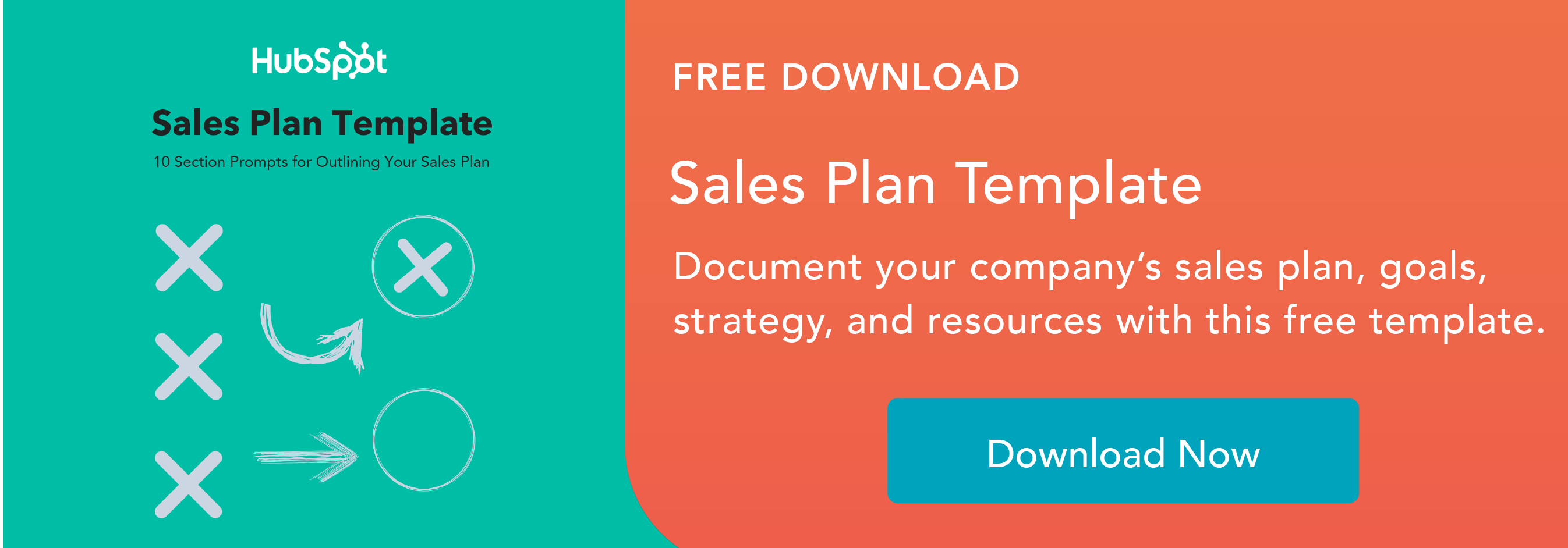In today’s digital world, the traditional methods of outbound sales are no longer as effective as they once were. Inbound sales offers a solution.
So what is inbound sales?
Inbound sales is a customer-centric approach that focuses on providing value and building trust with potential customers. Instead of pushing sales onto consumers, inbound sales allows them to come to you by offering valuable content, insights, and solutions.
Inbound sales transforms the selling process to meet the empowered buyer where they are using a personalized, empathetic approach. See more below.
Inbound Sales vs. Outbound Sales
Building Your Inbound Sales Process Free Download: Sales Plan Template
What is inbound sales?
Inbound sales is a modern approach that focuses on providing customers with value before pitching your product or service.
The process begins as potential customers discover your business through various inbound marketing channels, such as content marketing, social media marketing, and other online channels. They engage with this information and learn about the brand. Later, your sales team reaches out to continue nurturing the lead.
An empathetic salesperson is key to inbound sales. An inbound sales representative connects with their lead and learns about all their needs to ascertain if they are a good fit for their product or service.
An inbound sales representative takes on a personalized, consultative approach. They continue to build trust with the potential customer and determine how their product can best solve customer pain points. Of course, the goal is to make a sale, but not at the expense of customer delight.

Inbound vs. Outbound Sales
Inbound sales is a strategy based on attracting potential customers to your business through marketing efforts and providing them with valuable information and solutions to their problems. On the other hand, outbound sales involves actively reaching out to potential customers through various channels such as cold calling, direct mail, and email marketing.
Instead of cold calling strangers, inbound sales is focused on customers who reach out to the company directly after valuable experiences with their content and other online channels.
Check out the video below to learn about inbound sales and how it compares to outbound sales.
Inbound Sales Statistics
To understand the power of inbound sales, let’s look at a few quick stats:
- According to LinkedIn, 62% of B2B customers respond to salespeople who connect by sharing relevant content and insights with the buyer.
- 41% of B2B buyers view 3-5 pieces of content online before interacting with a salesperson.
- Personalization can help breed inside sales success. Nearly half (49%) of consumers say they will likely become a repeat buyer after a personalized shopping experience.
- Sales reps focusing on delivering value to customers during calls are 96% more successful.
The Challenges and Purpose of Outbound Sales
Compared to inbound sales, outbound sales can be difficult to implement for several reasons.
- Rejection. Outbound sales involves reaching out to potential customers who may not be interested in the product or service being offered. This can lead to a high rate of rejection and can be discouraging for sales representatives.
- Lack of personal connection. In outbound sales, representatives often contact potential customers through cold calls or emails. This can make it difficult to build a personal connection with the customer and create a sense of trust and rapport.
- Time-consuming. Outbound sales can be time-consuming, as it involves reaching out to many potential customers and following up with them until they make a purchase decision. This can take a lot of time and effort and may not always result in successful sales. On average, it takes 18 calls to actually connect with a buyer.
- Changing market conditions. The market conditions are constantly changing, and sales representatives need to be aware of these changes and adapt their approach accordingly. This can make outbound sales challenging and unpredictable.
However, there are instances in which outbound sales is effective.
For example, when a company is launching a new product or service and needs to quickly generate interest, outbound sales can be helpful. By proactively reaching out to potential customers, the company can create awareness and generate leads that can be nurtured into sales opportunities.
Nevertheless, inbound sales is much simpler. However, the challenging part is creating a strong inbound marketing foundation consisting of helpful, SEO-optimized content, and strong social channels to attract potential customers.
Simply put, inbound sales might take more work upfront, but it’s ultimately the easier approach once you’ve created a strategy. Outbound selling is more time-consuming and challenging because you’re selling to people who haven’t expressed interest in your brand.

Next, let’s review The Buyer’s Journey and how it affects your inbound sales tactics.
The Buyer’s Journey
It’s important to understand the buyer’s journey to effectively support the sales process. By developing an inbound sales process that aligns with the buyer’s journey, you can create a more personalized and effective sales experience for your potential customers.
The buyer’s journey consists of three stages: awareness, consideration, and decision.
Awareness
In the awareness stage, the potential customer becomes aware of a product or service that could potentially meet their needs. This awareness can be triggered by various factors such as advertising, word-of-mouth, or personal experience.
At this stage, the customer is looking for information about the product or service and is researching different options. An inbound salesperson should aim to understand how potential buyers describe their challenges and goals and how they attempt to learn more.
Consideration
In the consideration stage, the potential customer has identified their problem and is weighing the pros and cons of different options. This stage is characterized by a high level of research and comparison shopping.
Here, businesses need to provide potential customers with helpful information and content to guide them in making the right decision.
An inbound salesperson should know what other solutions buyers may be investigating and how your product can meet their unique needs.
Decision
Finally, in the decision stage, the potential customer has narrowed down their options and is ready to purchase. This is where businesses can provide a seamless and easy buying experience to convert the lead into a paying customer.
At this stage, sales representatives should aim to understand the buyer’s criteria. They can address any concerns and ensure they have a unique selling proposition that differentiates them from the competition.
Buyer’s Journey Example
To put it all together, imagine a recruiting company — let’s call them Tyre Recruiting — that focuses on helping healthcare and tech companies hire salespeople.
The Buyer’s Journey for their customers may look something like this.

Building Your Inbound Sales Process
Once the buying journey is defined, the next step is to build your sales process. The inbound sales process supports the buyer through their purchasing journey. As a result, salespeople and buyers feel aligned through the buying and selling process, not at odds with one another.
To develop an inbound sales process, ask yourself what your salespeople can do at the awareness, consideration, and decision stages to support buyers.
We recommend the following four-part framework for your sales process, or the Inbound Sales Methodology:
- Identify.
- Connect.
- Explore.
- Advise.

Identify
The first step in the inbound sales process is to identify potential buyers who may be interested in your product or service. This can be done through market research, social media listening, or customer profiling.
By understanding the demographics, interests, and pain points of your target audience, you can create an ideal customer profile. This makes it easier to target prospects who are most likely to be interested in your offering.
When identifying potential leads, it’s important to prioritize inbound leads who convert via a form on your site over passive buyers.
Connect
Once you have identified your target prospects, it’s time to reach out to them and establish initial contact. This can be done through various channels, such as email, social media, or phone calls.
This step aims to introduce yourself and your company and provide some initial information about your product or service. It’s important to be friendly and professional in your communication. Lead with personalized communication aligned with the prospect’s goals.
To personalize your outreach, you’ll need to nail down buyer personas. Define who decision-makers are at the organizations you are ideally trying to sell to.
In our Tyre Recruiting example, some buyer personas may be as follows.
- Persona A: VP of Sales at a technology company
- Persona B: Director of Recruiting at a technology company
- Persona C: CEO at a technology company
- Persona D: VP of Sales at a healthcare company
- Persona E: Director of Recruiting at a healthcare company
- Persona F: CEO at a healthcare company
All of the above personas are decision-makers at the types of companies that Tyre recruiting would like to sell to. However, each persona has different goals, preferences, pain points, and areas of expertise that must be considered when crafting the most personalized connection.
Once you have identified your personas, you can craft an outreach strategy tailored to each persona.
Here’s an example of an outreach sequence for Tyre Recruiting’s Persona A.
|
Attempt |
Medium |
Action / Content |
Next Attempt in: |
|
1A |
Call |
Passive Call #1 / Persona A |
0 days |
|
1B |
|
Passive Email #1 / Persona A |
0 days |
|
1C |
Social |
If Twitter handle exists, follow and retweet. |
2 days |
|
2A |
Call |
Passive Call #2 / Persona A |
0 days |
|
2B |
|
Passive Email #2 / Persona A |
0 days |
|
2C |
Social |
If company blog exists, subscribe and comment on recent article. |
3 days |
|
3A |
Call |
Passive Call #3 / Persona A |
0 days |
|
3B |
|
Passive Email #3 / Persona A |
0 days |
|
3C |
Social |
If the buyer responds on social, send a LinkedIn connect request. |
4 days |
|
4A |
Call |
Passive Call #4 / Persona A |
0 days |
|
4B |
|
Passive Email #4 / Persona A |
0 days |
|
4C |
Social |
If the buyer responds on social, send a LinkedIn connect request. |
Explore
The explore phase of the inbound sales process is all about engaging in conversation with your prospect to understand their needs, pain points, and goals. This is where you can gather valuable information about their business and industry, and tailor your solution to their specific needs.
To help guide an exploratory conversation with a prospect, consider creating a guide that outlines different steps of a conversation.
Here’s an example guide for our Tyre Recruiting example, featuring some dialog that can help guide a real sales call.
|
Step |
Sample Questions and Comments |
|
Build Rapport |
|
|
Recap Prior Conversation |
As we discussed on our initial call, you aren’t happy with your current website. You and your partners feel it does not accurately reflect your work's scope, quality, and impact. As a result, you are losing candidates to other, more digitally savvy firms. Does that recap sound right? Would you like to add anything? |
|
Set Agenda |
Can we talk about how I can help your mid-sized professional services firm compete with more digitally savvy firms? I have experience working with similar firms and can provide advice based on that experience. However, I find that every firm is unique, so I'd like more context about your goals, challenges, plans, timelines, and constraints. Are you available for a conversation today? |
|
Challenges |
I know that many healthcare partners, like yourself, have struggled with internet marketing in the past. And if you’re working with a web company for social media, SEO, and pay-per-click advertising, you might feel like nothing is improving. Have you ever faced any of these challenges? I’d love to hear about your experiences and see if there's anything I can do to help. |
|
Goals |
Do you have specific hiring goals and have you calculated how many candidates and applicants you need to reach them? Are there any additional goals for your hiring efforts? |
|
Plans |
|
|
Timeline |
|
|
Negative Consequences |
|
|
Positive Implications |
|
|
Authority |
|
|
Budget |
|
Advise
The advise stage of the inbound sales process is when a sales representative provides personalized recommendations and guidance. The sales representative should tailor their advice to the customer’s needs and make a compelling case for their product or service.
By uncovering the buyer’s context and tailoring their proposition accordingly, the inbound sales representative provides value beyond the generic information available online.
For more advice on optimizing your inbound sales process, check out the following video to learn more strategies to become an inbound closer.
Leveling Up With Inbound Sales
Inbound sales hinges upon developing a relationship with a potential buyer and truly understanding their needs. You’ll need to do the legwork to accomplish this goal. That includes gathering helpful content and building thoughtful personas for different types of buyers.
All this hard work is well worth the effort. Soon, your pipeline will be filled with leads who are more likely to buy.
Interested in learning more about inbound sales methodology? Check out HubSpot Academy Sales Training to begin your journey toward modern sales stardom.












